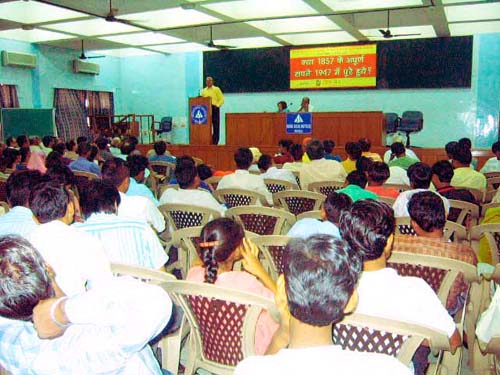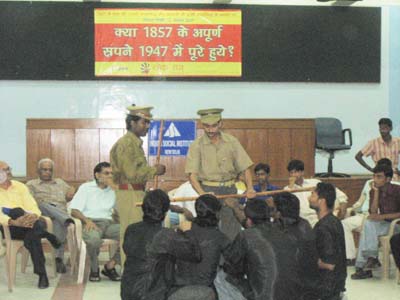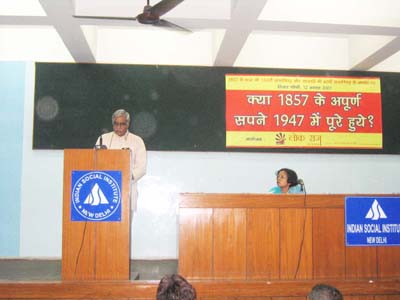
Archive 2009
|
August 16-31, 2007
Did 1947 fulfill the unfulfilled dreams of 1857?
Nearly 300 activists – working men and women, youth and students, residents of slum colonies and resettlement colonies, media persons, academics and other professionals, activists of political parties and mass organizations participated in this discussion. A majority of them were youth. Initiating the discussion, Comrade Prakash Rao, the spokesperson of CGPI and the convenor of Lok Raj Sangathan elaborated on how in the course of the revolutionary uprising of 1857, as well as in the numerous struggles of the people against both capitalist plunder and the usurpation of sovereignty by the colonizers, the question of people's power or lok raj has emerged. In August 1947, power did not get vested in the people of India. The Constitution of India does not acknowledge the existence of nations and peoples and their rights; instead it sanctions the use of military power against the peoples who want to affirm their national rights. It does not guarantee human rights including the right to conscience and the political system and process ensure that power does not vest in the people. The ongoing struggles of various sections of the people for their rights clearly show that people are not satisfied with a political process which does not allow them to decide their own destiny. The system of representative democracy, in which political parties rule in the name of the people and prevent people from coming to power, is no longer acceptable, he declared and put forward the demand for a system of direct democracy. He critiqued the platform of “good governance” being pushed by the imperialists and the bourgeoisie and declared that people do not want trustees to rule on their behalf. They want to rule themselves – Lok Raj . Chairing the discussion were comrades Sucharita and Bijju. Amongst those who participated in the meeting were Kenneth, Co-Convenor of the Naga Peoples Movement for Human Rights, Com Jasvir Singh from the Communist Ghadar Party of India, advocates Prashant Bhushan and Vrinda Grover, Prof Rizwan Kaiser, Jamia Milia Islamia, Dr. Kamala from Indian Law Institute, Prof Nandini Sundar from Delhi University, Prof Jagpal from Meerut, Ram Kishore of Bangladesh Bharat Pakistan Peoples Forum, writer Shivanand, Com. Renu of the Purogami Mahila Sangathan, Com. Santosh of Hind Naujawan Ekta Sabha, Luntinsat Kingpen of the Kuki movement, Malem representating Manipuri Students Association, Com Lokesh Kumar of Sanjay Colony Niwasi Sangharsh Samiti, Dr K.S. Subramanian, Dr N.K. Afandi of the Jamaat Islami e Hind, Dr J.K. Jain, Com Thaneshwar of NCWR, B.B. Tiwari of UNI Joint Action Committee, Dr. Rakesh Rafiq of Yuva Bharat, Narendra of Indian Federation of Trade Unions, Mohd Anwar of the Jamait Ulema e Hind, and journalist Siddharth Varadarajan.. Comrade Jasvir Singh said that in 1947 there was a situation wherein there was a possibility that the colonial rule would be overthrown through a revolution under the leadership of the communists, there would be deep going social transformations, and India would break out of the imperialist system. In these conditions, the British colonialists struck a deal with the Indian bourgeoisie to prevent the victory of Indian revolution, to prevent workers and peasants from coming to power, and to ensure that India remained within the imperialist system. Communal massacres were organised to drown the revolutionary struggles in blood. Punjab, Bengal and Kashmir were divided. Every aspect of the colonial state was retained, the army, the police, the civil services and all the colonial laws. The Constitution of 1950 was the constitution of those to whom the colonialists transferred power, the compromising wing of the Indian bourgeoisie which had thrown its lot with imperialism against the Indian people and against the revolution. The present Indian Union has been created through the forcible suppression of numerous nations and peoples. It divides the polity on communal and caste lines, as was done with evil intent by the colonial rulers. The Indian ruling class treats the Indian people and our vast natural resources as objects of loot and plunder, just like the colonial rulers. Today, sovereignty does not vest in the people. The political system ensures that people are deprived of sovereignty. It is the big bourgeoisie which rules through one or the other party or coalition that serves it best at the particular time. He called for replacing the present Indian Republic by a workers and peasants republic and a voluntary Indian Union. Dr. Kamala Sankaran addressed the colonial legacy in the political institutions of our country, the theories of “representative government” and “responsible government”. She pointed out that laws such as the Arms Act, the Societies Registration Act, the Unlawful Activities Prevention Act, the Press Act etc. which the British colonial rulers passed to crush the struggles of our people after 1857, still continue to be used against any form of popular dissent. Senior lawyer Vrinda Grover scathingly exposed the current ‘campaign for police reforms’ being promoted by the Home Ministry, which really aims at giving more powers to the police to torture people. Renu Nayak pointed out how the demand for 33% reservation for women would not help to end the exploitation and discrimination of women, unless people have the political power to bring about the fundamental transformations that the society needs. Prof. Nandini Sundar showed how the British colonizers had systematically deprived the tribals and other forest dwellers of their rights over the forest land, forest produce, water sources, etc. and that the present Indian state continues to do the same, in order to enable the big Indian and foreign monopolies to plunder our natural resources for their super profits. Prashant Bhushan pointed out that the present day judiciary is in many ways a continuation of the colonial judiciary which was used to legitimize the rule of the British Crown.. The use of ‘my lord’ to address a judge, the use of ‘contempt of court’ to criminalise any kind of criticism of the judiciary, are but symbols of this. He supported the call for direct democracy and raised pertinent issues on how to take the struggle for direct democracy forward. Kenneth, co-Convenor of the Naga People’s Movement for Human Rights, dwelt on the struggles of the Naga people for independence from the British colonizers and how the Indian state does not respect the right of the Naga people or other peoples to live in freedom. Condemning the gross violation of human rights using the colonial AFSPA and other methods, he denounced the Indian state’s evil intentions in the name of holding ‘peace talks’ and declared that the struggle of the Naga people for their rights will continue. Malem, representing the Manipuri Students Association of Delhi, called 1947 a deception and treachery. Denouncing the atrocities of the Army on the Manipuri people and the attempts of the Indian rulers to divide the peoples of the northeast and all over the country , he called for unity of all Indian people in struggle against the Indian state. Luntinsat Kingpen highlighted the struggle of the Kuki people in defence of their land and liberty. Siddharth Varadarajan pointed out that whether it is a question of upholding the right to conscience, or the question of where power must vest, or on the question of the unity of the Indian people irrespective of religious or caste differences, or the question of ownership of natural resources, the present Indian state is a continuation of the colonial state and not what the Ghadris of 1857 envisioned. Prof. Jagpal Singh put forward various ideas on reforms in the electoral process in order to empower people. Santosh Kumar of the Hind Naujawan Ekta Sabha called on the youth to rise in struggle for a system where people will be their own rulers and get rid of the Eurocentrist thinking that has been imposed on us by those who took over power from the British colonizers. Lokesh Kumar of the Sanjay Colony Niwasi Sangharsh Samiti related their experience of fielding candidates selected by the people for the MCD elections. He raised the urgent need for people to fight to secure the right to hold the legislators accountable and to recall them when they betray the people. Young workers from the Honda Factory Workers’ Union in Gurgaon enthralled the audience with a stirring rendition of their experiences, in the form of a short play, showing how workers are denied even the most basic right of security of livelihood and the right to organize to fight for their rights, how they have to face the savage barbarity of the big capitalists and the Indian state if they raise their voice in defence of their interests. Rounding up the discussion, the chairperson pointed out that all the speakers had, in different ways, shown decisively that 1947 did not fulfil the unfulfilled dreams of 1857. She called on all those present to unite in the struggle for vesting sovereignty in the people, for ushering in those thorough-going transformations whereby people will have the political power to shape their own destiny and our natural resources and the wealth created by the labour of our people will enrich the whole of society, not just a minority of exploiters and profiteers. |



